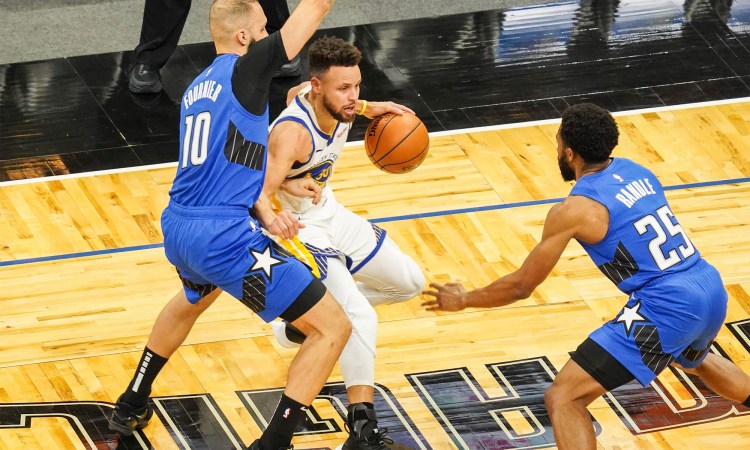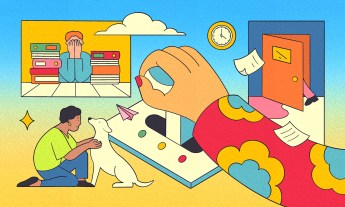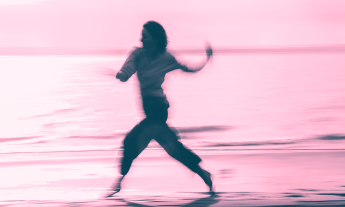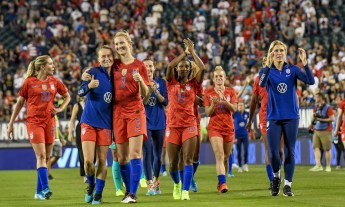
Ever wish you had a switch you could just turn whenever you needed to be focused and productive? While getting in the zone is something we all hope and strive for — whether it’s at work, at home, at school — it’s critically important for athletes.
In episode three of TED’s newest podcast “Good Sport,” host Jody Avirgan speaks to NBA All-Star Steph Curry and sports psychologist Dr. Nicole Detling to find out about getting there. Read our excerpt below, and listen to the entire episode here.
Jody Avirgan, host of “Good Sport” podcast: In sports, there’s a lot of talk about a magical place called THE ZONE.
You probably know it. It’s that place where everything clicks, where no matter the weather or the crowd or the sweat in your eyes, nothing can break your focus. Where you just do everything perfectly, you sink every shot and nothing can stop you. Steph, do you believe in the zone?
Steph Curry, Golden State Warriors point guard and nine-time NBA All-Star: I do believe in the zone, because it’s the one time that everything kind of goes on autopilot. And there’s just synergy with everything that you’re trying to do. Even your intentions are then validated by the atmosphere around you. Where it seems like everything else is going right at the same time, you kind of get lost in that moment. But here’s the thing about “the zone” — almost by definition, it’s special and fleeting and you can’t force it.
Steph: You can’t control any of that. It’s just for me, when it goes away, it’s the reflection on the feeling you just had. I think it’s just a natural experience.
Steph: I don’t think you can train yourself to appreciate it more than just you naturally do. ‘Cause if you do, then you start to distract yourself from what’s actually happening.
Jody: So you heard it directly from Steph Curry. Nice as it is when you find yourself in the zone, obsessing over getting there — and listen, there’s a lot of obsessing about the zone — will get in the way of what you’re trying to do.
Enter Dr. Nicole Detling, an expert on the mental side of the game. She’s a sports psychologist who’s worked with Olympic skiers and skaters, pro baseball and football and soccer players, college gymnasts — athletes at the very top of their sports.
As she starts to work with athletes, she tries to shift their thinking. She tells them to not think about the feeling they’re trying to capture but instead to work on building a solid and reliable skill.
That skill is mental resilience, which means being able to find whatever version of calm and focus you can, even when things aren’t going your way. It’s not elusive or magical; it’s a habit.
Dr. Nicole Detling, sports psychologist: We have these thinking processes and patterns and skills that we’re teaching people to eventually get it to automate. So it’s an automatic process. Rather than having to turn on that mindset, you become that mindset.
Jody: So much of mental resilience is realizing that everything isn’t going to go perfectly. I’ve worked on that. I’ve worked on — and here’s one of my favorite cliches — getting comfortable being uncomfortable.
The good news, Dr. Detling says, is that you can train for that.
Nicole: Some of the things that we’ve done with some of the skiing Olympians that I’ve worked with is we’ve not waxed their skis and they’ve had to train with unwaxed skis. Same with speed skating — you know that your blades aren’t quite as sharp as you would want them to be. Train that way, train with forgetting there’s a little tiny little tear in your suit. Train without your goggles.
That’s why a lot of teams will pipe in crowd noise so they can’t hear during training sessions. Because at the end of the day, we all want to show up and feel great but yet there will be days — sometimes the biggest competition of your life — and you show up feeling like crap. If you’ve trained feeling like crap, then you know you can compete feeling like crap.
Everyone — yes, everyone, not just sports fans — can learn something from listening to the “Good Sport” podcast, from how to debate better (sportscaster-style!) to how stadiums could be built more equitably. Discover more about yourself and the world around you as host Jody Avirgan talks to star athletes and eye-opening experts, including psychologists, journalists, economists and more. Listen here, or wherever you stream your podcasts.
Watch Jody’s personal intro to the episode — and also catch the episode itself — in this YouTube video:














